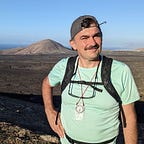The Radio Amateur’s “Elmer” and the OpenPlanetary Data Cafe at ESPC 2017
The Openplanetary Data Cafe session at the European Planetary Science Congress (EPSC) held in Riga on September 2017, proposed something different from the typical session you can find in a scientific congress. Something that resembled what happens in a slightly different context.
The activity of Radio Amateurs has always put together technical aspects of the radio transmissions and the communication among people sharing a passion. In fact, the Radio Amateur operator always loves to share his experiences in long distance (DX) contacts and experiments all around the radio-frequency spectrum allocated to the Amateur Service, which spans from the Very Low Frequency (VLF) to bouncing microwave signals to the Moon or Meteor Scatters.
This aspect of sharing experience is particularly important when a newcomer seeks for advice and support, and a more experienced operator responds and supports the first steps.
In an article in the March 1971 QST Radio Amateur magazine, Rod Newkirk (W9BRD) was referring to some people helping neophytes as “Elmers” because Elmer was the name of his mentor Elmer P. Frohardt Jr, (W9DY). If you know some friend of yours being a Radio Amateur for sure he will have memories of his own ‘Elmer’.
While co-chairing the OpenPlanetary Data Cafe, I was thinking that this, as well as some other hands-on sessions (as for example the writing tutorial by Nicolas Thomas) recall this “Elmer concept” within the field of Planetary Science.
At the EPSC session we have been speaking about technical aspects of our work as researcher, about techniques and tools to improve our research activity. Young students or newcomer in up-to-date technologies were there willing to renovate their knowledge, or simply to know about tools and methods for digital data handling. Basically, a passion in tools and methods in data analysis was the common ground.
Neither the Radio Amateur Elmer nor the Planetary Scientist Elmer is certified or paid to be an Elmer: she or he just share his own wealth of knowledge and experience with others.
Maybe all this is happening because, beside being researchers, we are following a passion related to the space exploration, and as the Radio Amateurs, we love to see our working and living environment in good health.
